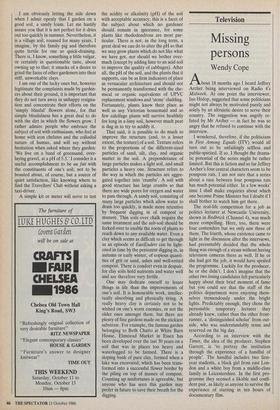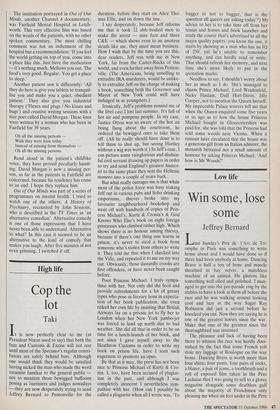Television
Missing persons
Wendy Cope
About 18 months ago I heard Jeffrey Archer being interviewed on Radio 4's Midweek. At one point the interviewer, Ian Hislop, suggested that some politicians might not always be motivated purely and solely by an altruistic desire to serve their country. The suggestion was angrily re- futed by Mr Archer — in fact he was so angry that he refused to continue with the interview.
I wondered, therefore, if the politicians in First Among Equals (ITV), would all turn out to be unfailingly selfless and public-spirited. If so, I thought the drama- tic_ potential of the series might be rather limited. But this is fiction and so far Jeffrey Archer's four central characters seem to be pompous rats. I am not sure that a series about a race between four pompous rats has much potential either. In a few weeks' time I shall make enquiries about which one became Prime Minister but I doubt if I shall bother to watch him get there.
The real-life competition for a job as politics lecturer at Newcastle University, shown in Redbrick (Channel 4), was much more compelling. Here, too, there were four contenders but we only saw three of them. The fourth, whose existence came to light in the discussion after the interviews, had presumably decided that the whole thing was enough of a strain without having television cameras there as well. If he or she had got the job, it would have spoiled the programme. Luckily for the producer, he or she didn't. I don't imagine that the other two losing candidates felt particularly happy about their brief moment of fame but you could see that the staff of the politics department were enjoying them- selves tremendously under the bright lights. Predictably enough, they chose the personable temporary lecturer they already knew, rather than the other front- runner, a 'distinguished scholar' from out- side, who was understandably tense and reserved on the big day.
According to an interview with the Times, the idea .of the producer, Stephen Garrett, is `to portray the institution through the experience of a handful of people'. The handful includes two first- year students, a black girl from east Lon- don and a white boy from a middle-class family in Leicestershire. In the first pro- gramme they seemed a likable and confi- dent pair, as likely as anyone to survive the experience of starring in ten hours of documentary film. The institution portrayed in Out of Our Minds, another Channel 4 documentary, was Fairfield Mental Hospital in Letch- worth. This very effective film was based on the words of the patients, with no other spoken commentary. The most chilling comment was not an indictment of the hospital but a recommendation: 'If you feel the world getting on top of you, come into a place like this. Just have the medication — it's nothing much. Mellows you out. The food's very good. Regular. You get a place to sleep.'
Another patient saw it differently: 'All they do here is give you tablets to tranquil- lise you and make you a quiet, obedient patient.' They also give you industrial therapy (Tlexes and plugs I No kisses and hugs') and creative writing sessions with a nice poet called David Morgan. These lines were written by a woman who has been in Fairfield for 39 years.
Oh all the missing persons Wish they were here today
Instead of missing from themselves - Oh all the missing persons.
Read aloud in the patient's childlike voice, they have proved peculiarly haunt- ing. David Morgan is now a missing per- son, as far as the patients in Fairfield are concerned, because his residency has come to an end. I hope they replace him.
Out of Our Minds was part of a series of programmes on mental health. I tried to watch one of the others, A History of Psychiatry, recounted by John Sessions, who is described in the TV Times as 'an alternative comedian'. Alternative comedy is one of those expressions that I have never been able to understand. Alternative to what? In this case it seemed to be an alternative to the kind of comedy that makes you laugh. After five minutes of not even grinning, I switched it off.



























































 Previous page
Previous page